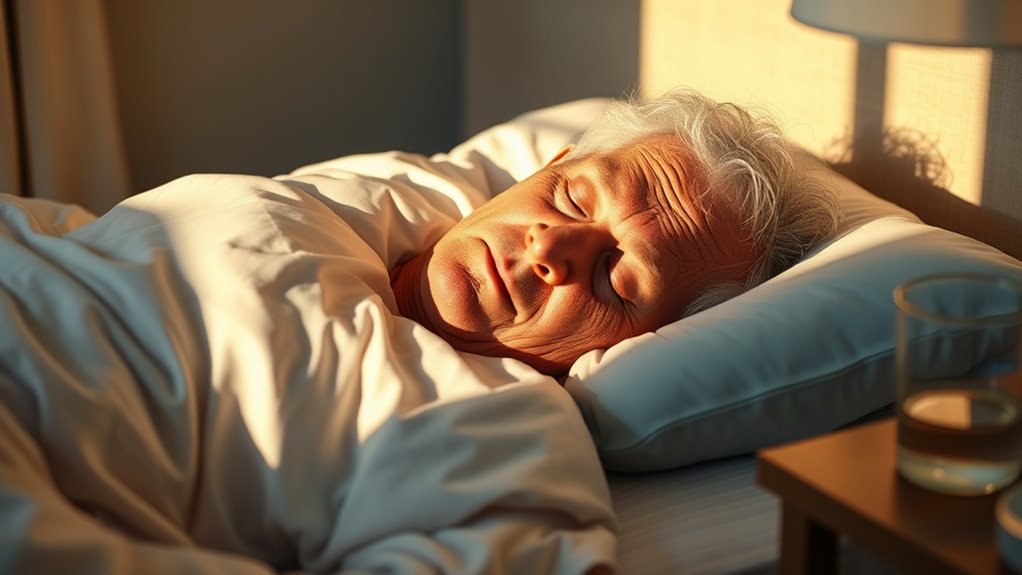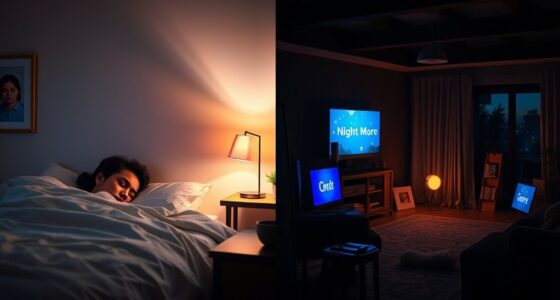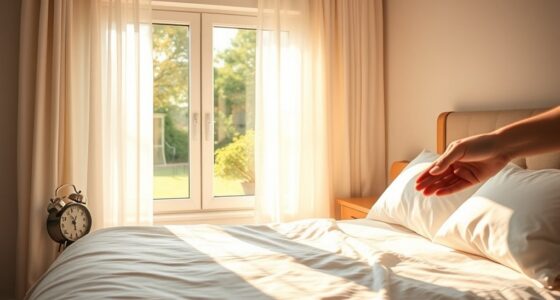As you age, it’s normal to experience changes in sleep, like lighter sleep and more awakenings, which can lead to insomnia. To improve sleep, stick to a consistent schedule, create a relaxing bedtime routine, and keep your bedroom cool and dark. Avoid screens, caffeine, and heavy meals before bed. It’s also essential to consult your healthcare provider to check for underlying issues or medication effects. Understanding these strategies can help you enjoy more restful nights—more tips are available if you continue exploring.
Key Takeaways
- Age-related sleep changes include decreased deep sleep and increased awakenings, but healthy habits can improve sleep quality.
- Establish consistent sleep routines and a relaxing environment to promote better sleep in older adults.
- Review medications with healthcare providers to minimize sleep-disrupting side effects and adjust treatments as needed.
- Address underlying health conditions like sleep apnea that may worsen insomnia or fragmented sleep.
- A holistic approach combining lifestyle modifications, good sleep hygiene, and medical guidance enhances sleep in seniors.

Have you ever wondered why sleep becomes more challenging as you age? As you grow older, changes in your sleep patterns are common, and understanding why can help you manage them better. One of the key factors influencing sleep in seniors is sleep hygiene. Good sleep hygiene involves establishing habits and a conducive environment that promote restful sleep. This means sticking to a consistent sleep schedule, even on weekends, and creating a relaxing bedtime routine. Avoiding screens, caffeine, and heavy meals close to bedtime can markedly improve your ability to fall asleep and stay asleep. Your bedroom should be cool, dark, and quiet, which helps signal to your body that it’s time to rest. These adjustments may seem simple, but they can have a profound impact on your sleep quality, especially as natural sleep patterns tend to shift with age.
Medication effects also play an important role in sleep challenges among the elderly. Many seniors take medications for various health conditions, and some of these can interfere with sleep. For example, certain antidepressants, antihypertensives, or medications with stimulant properties might cause insomnia or fragmented sleep. Conversely, some drugs may induce drowsiness, leading to irregular sleep patterns or excessive daytime sleepiness. It’s essential to review your medications with your healthcare provider regularly. They can assess whether any side effects are contributing to your sleep difficulties and may suggest alternatives or adjustments to your regimen. Avoid self-medicating with sleep aids unless prescribed, as these can have adverse effects, especially when combined with other medications or health issues common in older adults.
Age-related changes in sleep architecture, like decreased deep sleep and increased nighttime awakenings, can also make it harder to get restful sleep. These natural shifts don’t necessarily mean you need medication or drastic measures, but they do highlight the importance of maintaining good sleep hygiene and working closely with your healthcare provider. Sometimes, underlying health conditions such as sleep apnea or restless leg syndrome can worsen sleep problems, so proper diagnosis and treatment are essential. Remember, improving sleep isn’t just about taking pills; it involves a holistic approach that includes lifestyle modifications, medication management, and a healthy sleep environment. By paying attention to your sleep hygiene and being aware of medication effects, you’re taking important steps toward better rest and overall well-being as you age.
Frequently Asked Questions
Can Medication Help Improve Sleep in Older Adults?
Medication can help improve sleep, but you should be cautious about medication risks and dosage considerations. Talk to your healthcare provider to find the safest option, as older adults are more sensitive to side effects. They can recommend appropriate dosages and monitor your response, reducing the risk of dependency or adverse effects. Remember, lifestyle changes and sleep hygiene are also crucial parts of managing sleep issues effectively.
What Natural Remedies Are Effective for Elderly Insomnia?
Think of natural remedies as gentle lullabies for your mind. Herbal teas like chamomile or valerian root soothe your nerves, making it easier to drift into sleep. Melatonin supplements help reset your internal clock, much like a conductor guiding an orchestra. Together, these options can improve your sleep quality naturally, promoting relaxation and helping you wake refreshed each morning. Always check with your healthcare provider before starting new remedies.
How Does Sleep Apnea Affect Elderly Sleep Quality?
Sleep apnea causes significant sleep disruption in older adults by causing frequent breathing pauses during the night. These breathing pauses interrupt your sleep cycles, leading to fragmented rest and daytime fatigue. You might wake up gasping or choking, which further disturbs your sleep quality. As a result, sleep apnea reduces overall sleep efficiency, making it harder for you to feel refreshed and alert during the day.
Are There Specific Exercises to Promote Better Sleep in Seniors?
You can improve your sleep by practicing gentle stretches and relaxation techniques before bed. Gentle stretches help relax your muscles and reduce tension, making it easier to fall asleep. Incorporate relaxation techniques like deep breathing, meditation, or progressive muscle relaxation to calm your mind. These exercises promote better sleep quality, help you relax, and create a bedtime routine that signals your body it’s time to rest, leading to more restful nights.
How Do Sleep Patterns Differ Between Men and Women Over 65?
Imagine two trees growing side by side, one taller and more vigorous. Men over 65 often experience lighter, more fragmented sleep due to hormonal differences, like decreased testosterone. Women, influenced by hormonal shifts like menopause, may struggle with insomnia or disrupted sleep. Lifestyle factors, such as activity levels and stress, also shape these patterns. Recognizing these differences helps you tailor strategies for better rest, regardless of gender.
Conclusion
Think of sleep in your golden years as a delicate garden that needs tending. Just like a gardener carefully waters and prunes, you can improve your sleep by establishing routines and managing worries. Remember, even in the quietest night, your body still seeks rest, much like a lighthouse guiding ships safely ashore. With patience and small changes, you’ll nurture restful nights, turning your sleep into a peaceful, blooming garden that brightens your days.








